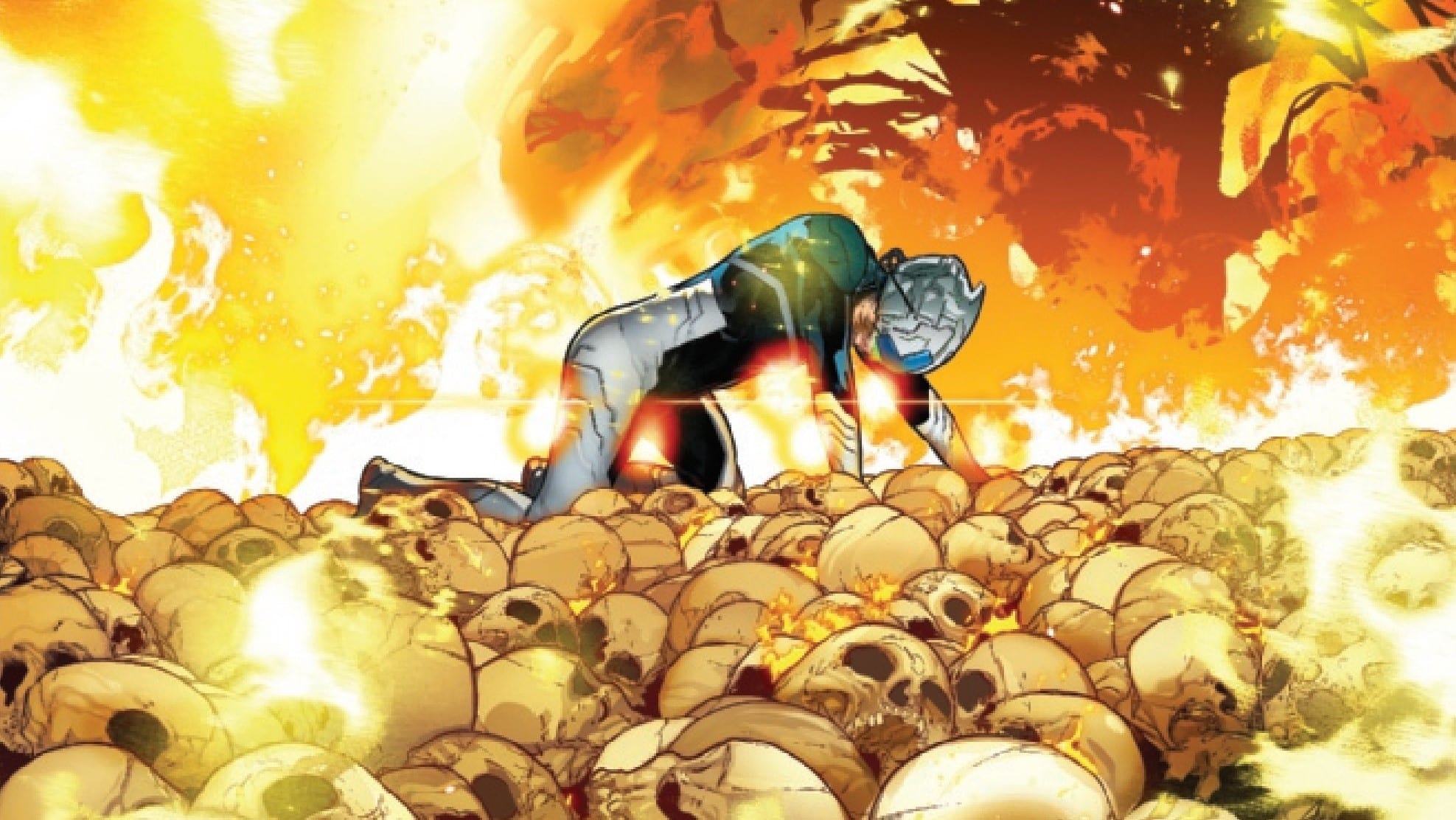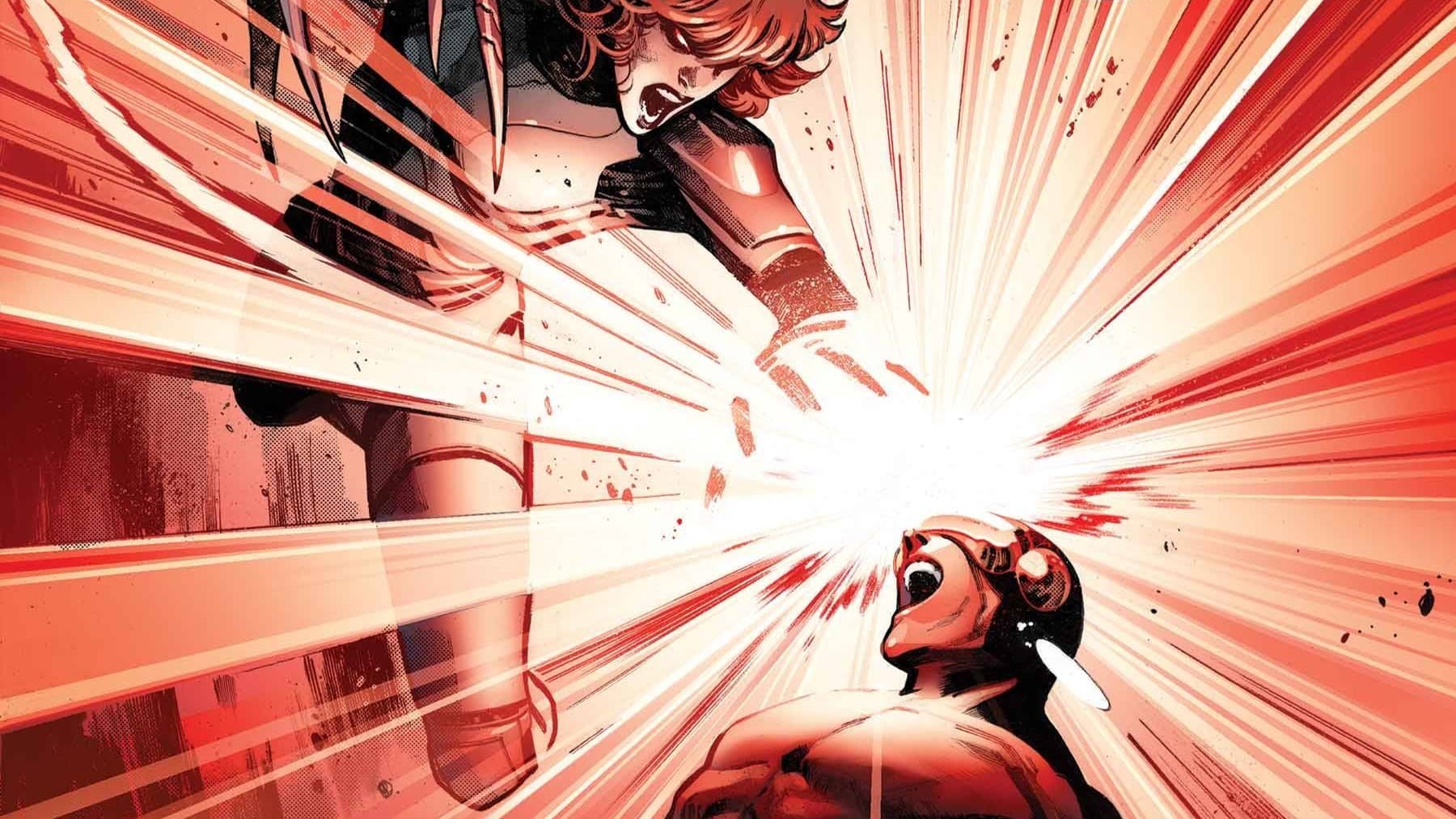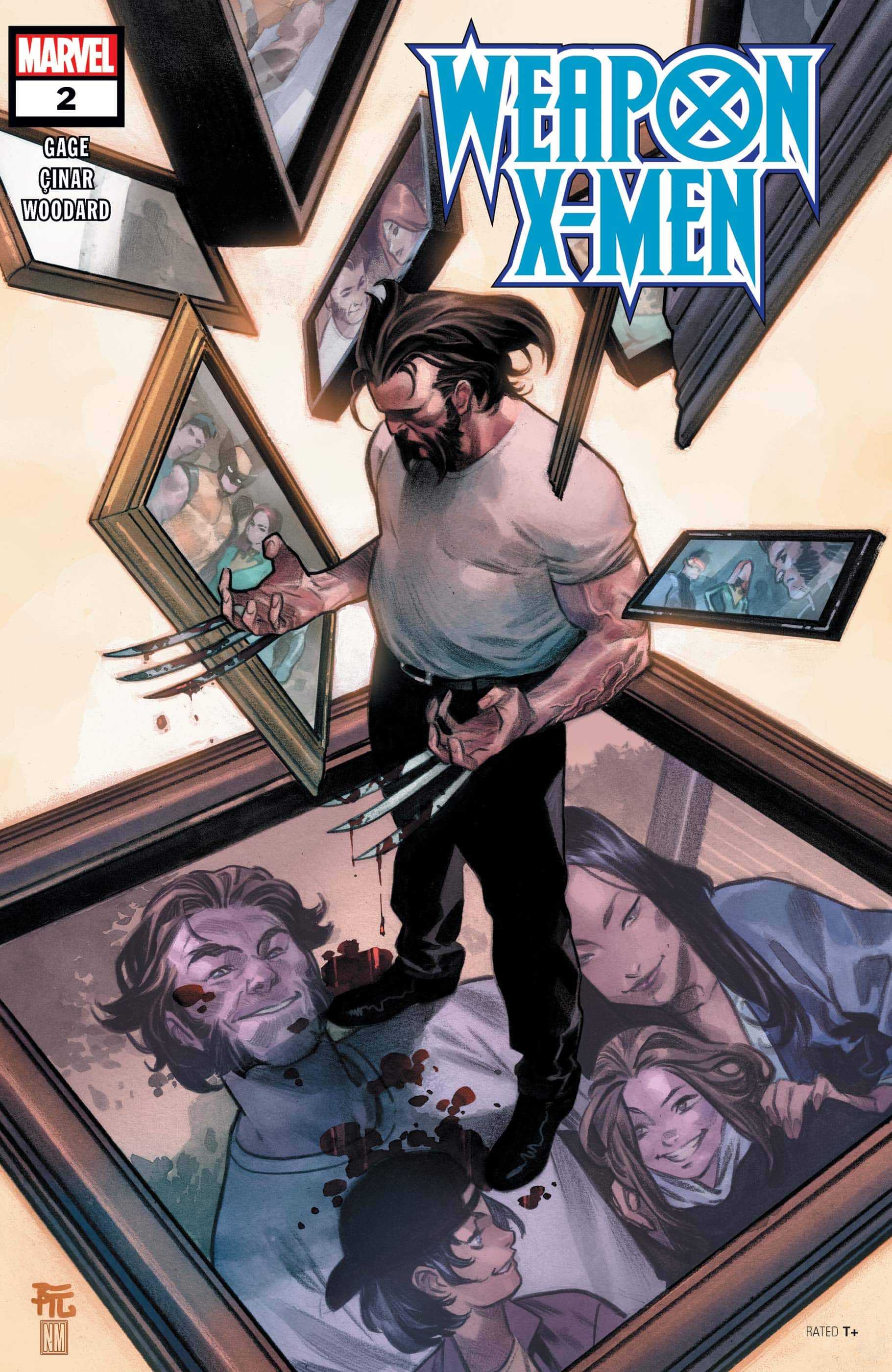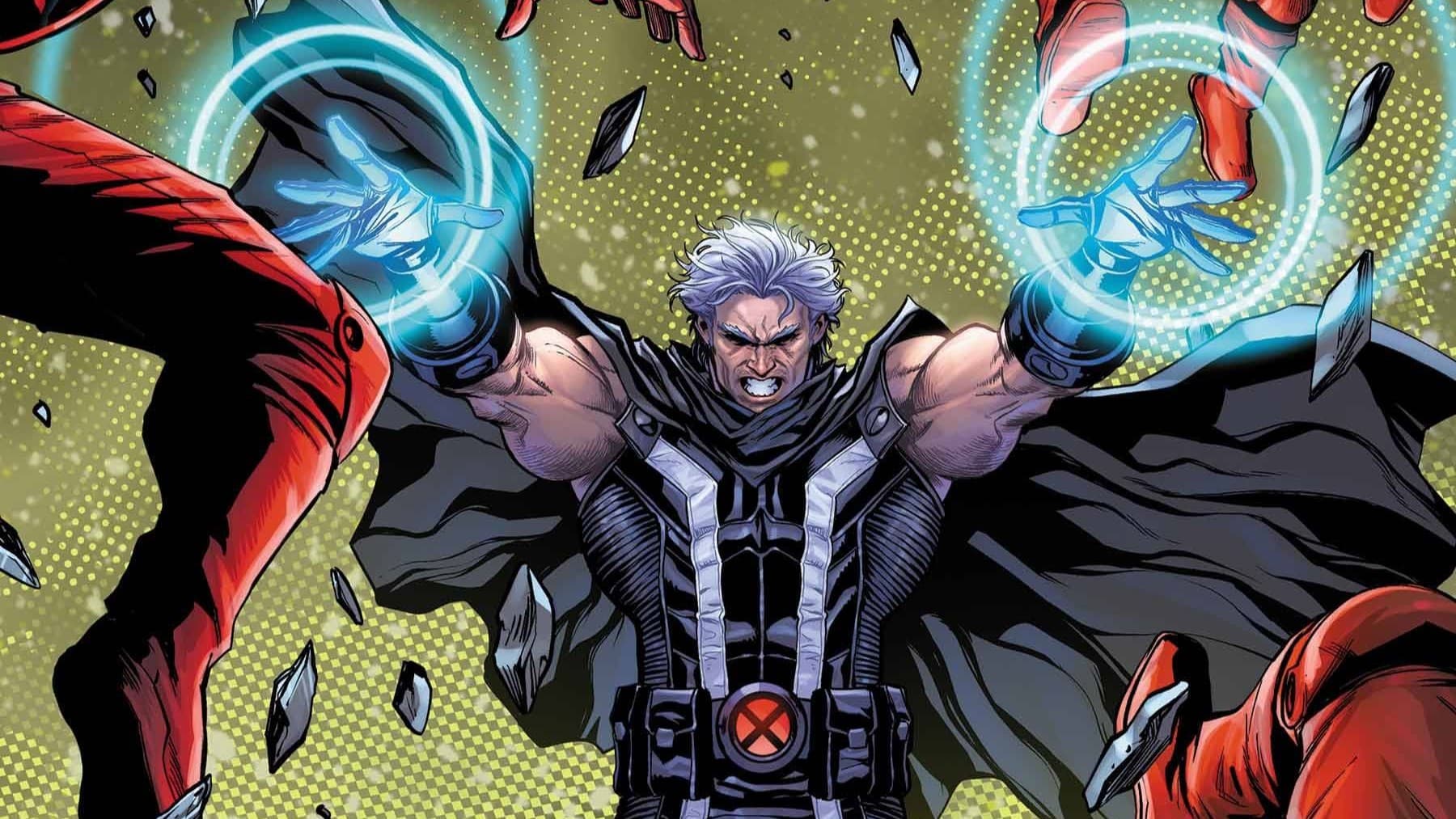Crucible’s today…
X-Men #7 by Jonathan Hickman, Lenil Francis Yu, and Sunny Gho
Chris Eddleman: We’ve come to another big issue, emphasis specifically on BIG, because this bad boy clocks in around 40 pages. But senior editor Jordan D. White also promised this one would be especially big on plot, or concepts, saying that if they would have thought of it—they would have highlighted this issue red in the reading order, much like several issues of HoXPoX. However, they did not, so we are simply to rely upon assurances. That being said, I’m pretty interested to learn what we’re about today.
Robert Secundus: I have been having stress nightmares about this issue ever since the cover was revealed. I try not to get too personal with these books, but Nightcrawler is one of my favorite characters of all time, and is, by far, my favorite X-Character. I’ve also been desperate for an issue that tackled the metaphysical questions of Krakoan life head-on or began to look at Mutant Religion. Now that it’s here, let’s everyone turn to #7 in your missals, and begin our opening hymn.
Pax Krakoa

RS: One thing I’ve been clamoring for in general is more time and space devoted to the citizens of Krakoa thinking about, and questioning, the status quo. We’ve seen both political and ritual aspects of Krakoan society that are, to put it maybe a bit reductively, complicated. It’s not a Utopia: it’s as messy as any attempt at Utopia realistically would be, and I think it should be expected that the vast cast of characters in these books would react very differently to the particulars of that attempt.
CE: And luckily, we get that right away, and honestly throughout the issue. Wolverine has never felt comfortable in his entire life but, we see that he’s having trouble sleeping in his interconnected moon bed, which frankly would also give me the heebies. But this reflects a little bit as Melody Guthrie also seems to have trouble sleeping in the Sextant back on Krakoa proper. Is perfection just a little too unnerving?
RS: That seems to be Nightcrawler’s implication when he talks about porting into The Tower [Ed. note: Which we talked a lot about in our coverage of Powers Of X #1] and discovering the most perfect place one could imagine. I think, though, that what they’re realizing is that it isn’t perfect, that there are, as Cyclop’s puts it, cracks in the firmament. Or to return to Nightcrawler, that there seems to be some sort of absence at the center of things. Of course, we know that there isn’t an absence at the center of Krakoa, that this whole endeavor isn’t slapdash, that there is an intelligence organizing and moving things– Moira X.
CE: Moira X, we can see her influence but not her. Back to the conversation of the beginning, in which Wolverine and Cyclops were having morning coffee—I guess that Chandilore vacation back from Issue #2 is going forward, with Wolverine both seemingly excited about Jean in a bikini and also about Scott in a speedo. Hickman really loves dropping these hints I see.
RS: Without any explicit confirmation of any representation beyond a WINK at the readers, of course, because God forbid that any kind of couple aside from a monogomously nuclear family heterosexual couple be represented in a Marvel Comic. Unless, of course, part of the couple is dead. Then we’re allowed explicit confirmation.
CE: But the crux of their discussion is about The Crucible, and whether or not it is a worthwhile way of solving “the problem.” Granted, while reading this, we can’t really know what the heck they’re talking about but it’s interesting to me that Scott is having the big moral issue while Wolverine is remaining rather laissez-faire about it, with the caveat that he’s not thrilled about it. This seems a slightly far cry from the Schism era boys.
RS: I think it’s a natural progression of their arcs over the past decade; they’ve been humbled by their mistakes. I mean, ok, Hashtag Cyclops Was Right, sure, but both of them took drastic actions based on deeply held convictions, and those actions resulted in strife, conflict, and suffering. It makes sense to me that both would be willing to differ leadership, to take comfort again in a higher authority, like they used to, when they were younger. And it also makes sense to me that Cyclops would be the first to begin chafing under this authority.
CE: It’s nice to return a bit to “Not My Real Dad” Cyclops, at least a little bit. Another perspective I would love to touch is Camp Counselor Exodus, who again plays the role of tale-teller around the campfire with the mutant children. However, this time he tells us about the necessity of the Crucible.
Crucibility

RS: Before we get into the nature of that Crucible, I think we should comment on what prompted its necessity, as that event looms large in Exodus’ campfire story: M-Day, the day in which Scarlet Witch proclaimed “No More Mutants” but actually meant “only 198 Mutants, I guess,” and the vast majority of mutantkind lost access to their powers. Two things bother me about M-Day and the Crucible. The first is metatextual: twice it seems like Marvel has produced stories intended to reverse M-Day. The first, Avengers VS X-Men, undid it partially, in that mutant babies began to be born again. Subsequent stories still treated the mutant population as 198+ babies, rather than simply treating the spell as completely undone. In the recent X-Men: Blue, we saw the Sinister technology Mothervine undo the effects of M-Day at least for some mutants, and the most recent volume of New Mutants has confirmed that Mothervine’s effect stuck for at least some mutants (see: Beak). So this is the third story about undoing M-Day stuff, and that feels so tiring in an era about bold new stories.
CE: At least this seems like it’s likely going to be it for reversing M-Day. This reads to me as very “whichever mutants you need for the story are now empowered.”
RS: The second is thematic. It seems like Hickman is turning (at least in part) to René Girard’s work for the foundations of Krakoan Society. Girard argued that early human society relied on scapegoating, on choosing some individual or group to treat as an other to be sacrificed in order to ensure unity within that society. (I’m being ultra-reductionist, but that’s accurate enough for our purposes here). It seems that THE PRETENDER, WANDA MAXIMOFF has been chosen to be the Krakoan scapegoat. This itself bothers me for two reasons: 1. The story of The Scarlet Witch and M-Day has been treated subsequently as a story of Mental Illness, not as a story about an evil person intentionally committing genocide. 2. I’m not a huge Classic Avengers Guy, but my impression is that fans of the character find that story to be extremely, extremely out of character, that the general consensus is the writer wrote that character not as herself but as the Macguffin he needed to tell the story he wanted (which happened to participate in seriously harmful ableist and misogynistic tropes). I don’t love that a character’s worst story continues to be her defining story.
CE: It’s really hard to love the storyline conceit of “Scarlet Witch is a Human and Also Evil” and also hate that the Scarlet Witch also undergoes regular character assassination. But alas, she is the scapegoat for the sake of the story. The story in this case being “What About Everyone Depowered on M-Day?.” This is how we arrive at the Crucible. And to briefly summarize, the Crucible is a ceremony in which a depowered mutant undergoes ritual combat (in front of a crowd) against the fittest of them all, Apocalypse with the purpose of dying a heroic death to be reborn by the Five. This certainly reads a way.
RS: I think first of all, we should talk about the name. Chris, in a lab– chemical or alchemical– what does a crucible do?
CE: It’s a container in which chemicals can be subjected to extremely high temperatures. Basically, just a very heatproof container. I’ve used a few in my day. Since superheated material could be considered super-strong, “forged in a crucible” comes from this.
RS: Additionally, The Crucible is the name of an Arthur Miller historical drama famously depicting American witch trials. I’m not sure the reference is intentional, but two things stick out to me as parallel: the first, the motivating force of religion. The Crucible depicts the Satanic Panic which broke out in Salem and the resulting trial and torture of suspected witches. The torture should reveal to the rest of the Puritan community, which sees itself in Utopian terms, as a Shining City on a Hill, which of its members are members of the true, good, and virtuous Elect, and which belong to the damned. Second of all, the most famous scene of the story, Giles Corey is tortured by press, and reveals to the audience that he is incredibly strong, that he is far better than his ignorant enemies, by demanding the torture continue: he calls out “more weight!”
RS: Chris, we’ve talked about the background of the ritual and its name; what do you make of the ritual itself?
CE: The ritual is very…barbaric, but reminds me very much of the Greek aristeia in which the hero is given a very poetic heroic death in single combat. Apocalypse being the arbiter ensures that the hero is tested, and thus deserving of an honorable death. There’s a lot to unpack with it though. It could be said to give the hero, the one wanting resurrection, an opportunity to feel like a mutant again, and regain their mutant abilities. That being said, having to earn your actual birthright doesn’t feel great to me.
RS: I think you’re getting at interesting tensions. It feels both barbaric and noble. Both elegant and brutal. I felt extremely conflicted when reading it, but I think that feeling is a good thing in a religious ritual. I’m of the opinion that ritual is at its best when it disquiets rather than comforts.
So, to break down my conflict: first of all, it’s important to note that I’m a person with some Brain Problems, and so it felt really, really weird to see ritualized suicide glorified, especially when that ritual requires the participant to be slain by a person voicing the kinds of thoughts that lead people to death. On the other hand, I can recognize that this is a kind of catharsis. It’s suicide, but specifically in a fantasy setting where death is impermanent, and so those intrusive thoughts are embodied here, and fought and fought until the participant is reborn. Second point of conflict: it feels like it’s in conversation with real religious rituals. Christian Baptism is traditionally framed in terms of death and birth into a new life. There’s also shades of Christian Funerals, which emphasize that death is temporary, and that the body will live again, but with the imperfections of our fallen world absent; I’ve been to funerals that devote the entire sermon to the magical powers that the preacher believes they will receive after the Resurrection. But what can we really say about the meaning of the ritual, in the end? Nightcrawler and Cyclops discuss how it was created, and it wasn’t designed with any kind of meaning in mind. It was not designed to reflect some truth or lead its audience to some search for truth. It was designed purely pragmatically, as a way to ensure that not too many mutants wanted to get their powers back.
CE: I like where you’re going with baptism, especially since everyone who undertakes this ritual ends up fully submerged—in egg goo! While I think pragmatism was maybe in mind, the Crucible is very sacramental. The Crucible is performed in front of a community where the participant chooses to undertake it. It’s just that once it’s done, the outward sign of your participation is the very public showing of your powers.
What do you think about “the wills”? There are lots of implications for it, being able to design your perfect self, in terms of your perfect self-image, but also some possibly gross implications, like “curing” ailments that don’t need curing.
RS: I’m excited first and foremost to see this explored in the upcoming X-Factor, and I’m excited to read what other folks make of it; I think a reading through the lens of disability would produce a very different response than a reading through a trans lens. I hope we see a variety of perspectives in the community’s critical conversation! The one thing I can speak to is Kurt and Scott’s reaction, which I think is extremely, extremely odd, and which isn’t justified here. Why do either of these individuals see a problem with the wills? Why would either care about preventing a person from choosing whatever body they please? I don’t see how either could ethically oppose any will. Hell, setting all ethics aside, why would Cyclops specifically worry, as he does here, about mutants coming back with Magneto’s powers? We opened this era with data pages framing Omega Level Mutants as a precious resource. Now Cyclops is concerned that more mutants might attain Omega Level status?
CE: I think it has a lot to do with the dichotomy that we’ve seen throughout this series, and HoXPoX, which is that mutantkind adapts to their environment, and can therefore be seen as natural. Homo novissima direct their own growth, and are unnatural, which I think is what is maybe making Cyclops uncomfortable, that directed growth.
De Ente et Essentia

CE: So we absolutely have to close our discussion with the talk of souls, which we definitely touched on in our House of X #5 article. Kurt is having a lot of struggle with the idea of an immortal soul with respect to the resurrections, and as both we and he come from a similar Catholic upbringing, we should probably give it a discussion. As for what a soul is, X-Men seems to mostly be focusing on the “soul” as the animus or consciousness of a mutant. It seems more to be the sum total of experiences rather than anything supernatural. I mean, they store it in a hard drive.
RS: The thing that interests (and bothers) me is the use of Nightcrawler as the focal character for these questions. Nightcrawler, first of all, should be relatively learned, metaphysically speaking. He quotes a zen koan here and vaguely alludes to “the bosom of the Church,” but he doesn’t seem to ground his investigation in any concrete understanding of a “soul.” If Xavier treats the soul as a collection of experiences, Kurt should be asking “Do I even mean the same thing by ‘soul’? If a soul is based on experience, is it mutable? Does that mean it can die? How can it exist in a hard-drive? Does that prove the gnostics right, that we aren’t hylomorphic composites, that we’re just souls trapped in matter that can be moved around willy nilly?” Etc. Also, (second of all), Nightcrawler’s most important story of the past decade (really, the only significant story in which he featured prominently) concerned his experience as a soul dead and in heaven as well as his time as a Purgatorial Pirate. Nightcrawler has direct experience with an afterlife and resurrection. But neither his study of the soul abstractly, as a priest, nor his experience with the soul, as a once-dead X-Man, really seem to affect his considerations here.
CE: Kurt would likely believe in the full-body resurrection that is said to be brought about at the End of Time, which would very much conflict with the often total destruction and recreation of the body that would happen under Krakoan Resurrection protocols.
RS: All Resurrection of the Body stuff, before you get to superhero stuff, descends into angel-on-the-head-of-a-pin type questions pretty quickly. We might ask, ok, how can Kurt believe in a perfected Resurrection of the Body at the End of Time if he’s already been in a number of bodies– what actual matter gets reconstituted? But we’d ask the same question of a man who ate an apple from a tree that grew in a graveyard. The same Carbon is part of two bodies across time– what actual matter gets reconstituted at End of Time, and in whom? Everything about the Resurrection of the Body in all corners of Christianity, from the Rapture, to the superhumanity of the actual Resurrection Bodies themselves, I find extremely difficult to make sense of. Kurt himself talks a little about the Last Things here, but in a way I find extremely odd: “Why seek heaven if we can– for all time— do God’s work here in the living world? Is our true cross now the burden of creating a heaven on Earth?” It seems like a reversal of a critique I seen often posed to the religious, that the promise of heaven makes people less likely to seek improvement here, on this Earth.
Instead now Kurt worries that with death conquered, no one would care to seek heaven. This is, historically, not how most Christians have actually thought of Earth and Eternity. Some would claim that it is folly to seek the City of God on Earth, but others, countless others, including those depicted in The Crucible, mind you, devoted their lives precisely to “creating a heaven on Earth.” They would not see an opposition between “seek[ing] heaven if we can” and “do[ing] God’s work here in the living world.” This is especially a false dichotomy, I would think, for a Catholic like Kurt, who very much would see, to the scandal perhaps of non-Catholic, sola-Fide Christians, seeking heaven necessitating good works. Immortality wouldn’t change any of this, because all Christianity still believes in an eventual end for all, no matter how long-lived, at the Second Coming. Even if death is conquered in terms of our mortal bodies, the universe itself will, eventually, die.
CE: Well put, Rob. I’m curious about how Kurt feels resurrection and the mundanity of it. The mutants still treat it like a miracle but, it’s hardly what Kurt would likely feel about a resurrection. And the fact that mutantkind can bring it about, by themselves, well, that puts them somewhat on the level of divinity, right?
RS: From certain perspectives, yes, I think it would. But I’m going to turn that angle over to you; I know you’ve been reading up on some Religious History that provides interesting parallels here.
CE: Why, thank you! I’ve been reading Bart Ehrman’s From Jesus to God- From Good Teacher to Divine Savior, which is a book about how early Christianity seemed to not necessarily believe in the divinity of Jesus but, that it was the stories about resurrection that turned teacher into God. I wonder if Kurt is having to wrestle with resurrection being a fundamentally divine act in his cradle Catholicism.
RS: As we wrap up, I gotta say, I’m really struggling to summarize my feelings on X-Men #7. You’d think the Religion Issue using Nightcrawler to explore Krakoan Culture would be my favorite issue of the era, but in the end, I’m just too close to the subject and the character. I’m just too entrenched in my own understanding and expectation. I think this is an excellent issue of comics, and that a lot of people are not just going to enjoy it, but be profoundly moved by it. But when I read it, I keep getting stuck. I hear Nightcrawler’s voice, and to me it’s all wrong; my Nightcrawler would also be asking the kinds of questions we see in the issue, but he wouldn’t be so detached. He’d cover deep, deep anguish with lighthearted humor and energy. When I read that last line, I recognize that’s a huge line that’s going to excite a lot of people for what comes next. But I read it and wonder how it fits with any version of the character; is Nightcrawler a devout Catholic, like he implies in the issue? Why then would he reject his own beliefs and make new ones? Is Nightcrawler now an ex-Catholic, doubting his old faith given his recent experiences?
That seems to fit this issue as nicely, given he is now questioning the nature of his own soul. But have you met many disillusioned ex-Catholics? I find they end up like Joyce or Graham Greene, not founders of new religions. And I can’t get away from that word, make. Kurt is, again, asking questions throughout this issue. Does he want to seek answers that arrive at some kind of truth, or does he want to create responses to those questions that are useful? And that question brings me back to the final tension I discussed in the Crucible. Overall, I feel like this story sees religion as a social tool which might be either helpful or harmful when used by those tasked with designing and running a utopia, not as something which might reveal or conceal some truth. It’s a way of approaching religion (as well as, more broadly speaking, theology and philosophy) that I just can’t be fully interested in. I recognize that my response is due to my own history, hangups, privilege, and experience, but, well, this time I’m having a real tough time getting out of my own head. I’m having trouble setting all that aside.
CE: Bud, it’s a tough call. It does sound a little bit strange coming from Nightcrawler. You think he would just end up saying something about reconciling religion, rather than “I need to create a religion” but we are working under the melodrama of superhero comics. It’s possible that Kurt is trying to explore this resurrection ritual to try to gain some metaphysical truths, but he just really comes out and says it doesn’t he? We just need that stinger I guess.
I also thought that this was an excellent issue of X-Men, through the static faces having chats were not the world’s most wonderfully constructed panels. I liked the interspersion of action and dialogue, where we got to see the combat ritual unfold while it was simultaneously discussed. This does seem to be setting up the entire series of X-Factor, which I’m incredibly excited to read. Boy oh boy though, this seems like another possible pivot point in the DoX era, in which someone might come out strong against this ritual, as we saw a little bit with Cannonball. This issue read beautifully though, and it deepens the status quo. I feel like it’s going to be quite some time before we bottom out.
X-Traneous Thoughts

- Does Warlock live in Doug’s arm? Or does Warlock live in the techno-infected Krakoa?
- The Tower has returned. Does it portend doom?
- Is Hickman going to actually do Summers Beach Vacation? Will our swimsuit special hopes be fulfilled?
- We all know Adam-X is a board shorts guy, even if Scott is a speedo man.
- Is Melody going to have to file a trademark dispute with the other character named Aero?
- Krakoan says: “Acanti.” It’s whale time!
Chris Eddleman is a biologist and co-host of Chrises On Infinite Earths.
Robert Secundus is an amateur-angelologist-for-hire.







